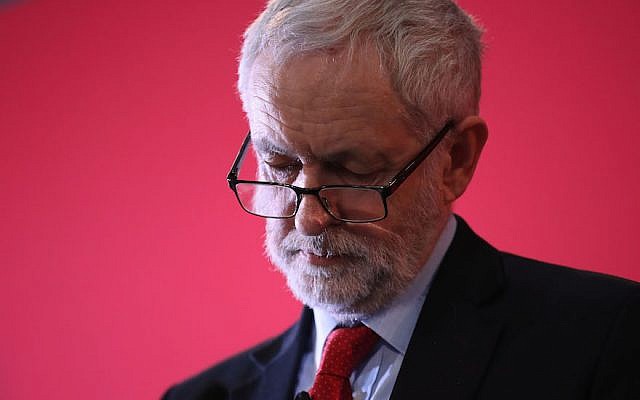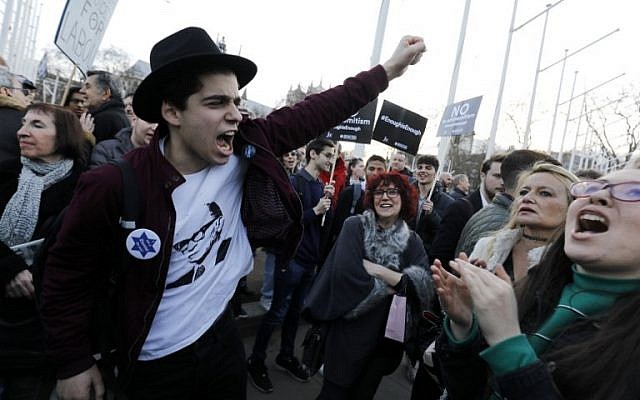Under-fire UK opposition leader finally addresses mounting accusations that his party is a hotbed of Jew haters and that he has done little to oppose them

UK Labour leader Jeremy Corbyn on Friday vowed to root anti-Semitism out of his party, but dismissed accusations from the British Jewish community that the prospect of his party coming to power posed an “existential threat” to the Jews.
Corbyn had been expected to make a speech to the Jewish community, but in the end published a letter in the Guardian newspaper on Friday entitled “I will root anti-Semites out of Labour – they do not speak for me,” finally addressing the mounting accusations that his party is a haven for anti-Semites and that he has done little to stop them.
“Driving anti-Semitism out of the party for good, and rebuilding that trust, are our priorities,” he wrote, but he categorically dismissed the accusations that the party represented a threat to UK Jewry, calling the notion “overheated rhetoric that can surface during emotional political debates.”
“I do not for one moment accept that a Labour government would represent any kind of threat, let alone an ‘existential threat,’ to Jewish life in Britain, as three Jewish newspapers recently claimed,” he wrote.
However, he did promise to take Jewish fears seriously.
“But I do acknowledge there is a real problem that Labour is working to overcome. And I accept that, if any part of our national community feels threatened, anxious or vulnerable, not only must that be taken at face value but we must all ensure those fears are put to rest,” he wrote.
His article was dismissed by the Jewish Labour Movement, who called for real action.
“Today, other than another article bemoaning a situation of the Party’s own making, nothing has changed. There is no trust left. We find ourselves asking once again for action, not words,” JLM said in a statement.
Pressure on Corbyn has intensified after a series of anti-Semitic scandals involving both members of the party and himself.

Last month, the party’s ruling body and leadership endorsed a code of conduct that excluded several of the International Holocaust Remembrance Alliance examples of anti-Semitism. The party has come under fire from Jewish members of Labour and the British Jewish community for not adopting the full definition, particularly items related to Israel.
The current Labour guidelines on anti-Semitism, approved last month, omits at least four points featured in the original IHRA list, including accusing Jews of “being more loyal to Israel” than their own country; claiming that Israel’s existence is a “racist endeavor”; applying a “double standard” on Israel; and comparing “contemporary Israeli policy” to that of the Nazis.
Among the scandals that have emerged in just the last week regarding Corbyn himself were the revelations that he gave an interview to Iraqi TV in 2015, in which he calls the Balfour declaration “bizarre” and questions the founding of Israel; that he hosted a parliamentary event in which a Holocaust survivor compared Israel to the Nazis; and that in 2011, Corbyn was among a group of predominantly Labour politicians who proposed changing the name of Holocaust Memorial Day to “Genocide Memorial Day – Never Again For Anyone,” to reflect that “Nazism targeted not only Jewish [people.]”
In the past he has called the Hezbollah and Hamas terror groups his “friends.” In 2016, an interparliamentary committee accused Labour of creating a “safe space for those with vile attitudes towards Jewish people.”
Not in my name
In his letter Friday, Corbyn promised to take “whatever measures are necessary to guarantee the security of Jewish communities, Jewish schools, Jewish places of worship, Jewish social care, Jewish culture and Jewish life as a whole in this country.”
He also pledged to work so that Jews once again feel at home in the Labour party.
“Driving anti-Semitism out of the party for good, and rebuilding that trust, are our priorities,” he wrote. “One part of that is working to ensure that all Labour party members show a higher degree of empathy with the perspective of the Jewish community, a community which endured a campaign of extermination across Europe just 75 years ago.”

Corbyn also acknowledged that his party had been “too slow in processing disciplinary cases of anti-Semitic abuse, mostly online,” citing cases of Holocaust denial and crude anti-Semitic banker stereotypes.
But he said that perpetrators made up only a tiny fraction of Labour members.
“But one is too many,” he vowed. “Our party must never be a home for such people, and never will be. People who dish out anti-Semitic poison need to understand: you do not do it in my name. You are not my supporters and have no place in our movement.”
An affinity for Israel
Corbyn said he would consult with Jewish community leaders to try and resolve the dispute over the definition of anti-Semitism, saying that the only real difference in opinion revolved around the issue of “free speech in relation to Israel.”
“I fully understand and respect the strong affection and affinity most Jews in Britain feel for Israel, whatever their view of the current Israeli government,” he wrote.
“It is unfortunately the case that this particular example, dealing with Israel and racism, has sometimes been used by those wanting to restrict criticism of Israel that is not anti-Semitic,” he wrote.
“All of us committed to peace and justice in the Middle East accept that the perspective of the Palestinian people, and their experience as victims of racism and discrimination, should not be censored or penalized any more than the right of Jewish self-determination should be denied.”
Corbyn said his concerns over Israel’s treatment of the Palestinians and its Arab minorities were shared by many UK Jews and that this “should not be a source of dispute.”
He ended by calling on British Jews to join with Labour in confronting the rise of the far-right in the country which was “threatening black, Muslim and Jewish communities alike. That is a clear and present danger,” he wrote.
As reported by The Times of Israel
